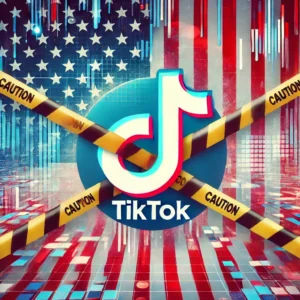TikTok Faces Uncertain Future in the U.S. After Losing Appeal

TikTok’s struggle to avoid a looming U.S. ban or forced sale has hit a critical setback, with a federal appeals court rejecting the company’s challenge to a law targeting its operations. The court’s decision upholds legislation that could lead to TikTok being banned or sold by early 2025, citing national security concerns over its alleged ties to the Chinese government.
TikTok, which has 170 million active users in the U.S., argued that the law violates free speech rights under the Constitution. However, the court ruled that the legislation was “carefully crafted” to address risks posed by foreign adversaries. The company has now vowed to take its legal battle to the U.S. Supreme Court.
National Security or Free Speech?
The U.S. government has long expressed concerns that TikTok’s parent company, ByteDance, is influenced by the Chinese state, a claim both TikTok and ByteDance deny. Lawmakers argue the app poses a “well-substantiated national security threat” due to data privacy and potential influence risks.
In response, TikTok’s spokesperson called the ruling “based on flawed and hypothetical information” and warned that a ban would amount to censorship of millions of American users.
“The Supreme Court has historically protected Americans’ right to free speech. We’re confident they will uphold this principle in our case,” the spokesperson said.
Political Dynamics: Trump’s Potential Influence
Donald Trump’s victory in the 2024 U.S. Presidential Election may reshape TikTok’s fate. Despite attempts to ban the platform during his first term, Trump recently pledged to block any action enforcing the law.
Set to be inaugurated on January 20—just one day after the legislation’s deadline—Trump’s stance offers a glimmer of hope for TikTok. However, experts like Professor James Grimmelmann of Cornell University caution that bipartisan anti-China sentiment in Congress could make it difficult for him to reverse the momentum.
Impact on Users and Rival Platforms
The potential ban has left creators and businesses that rely on TikTok in a state of uncertainty. For many, TikTok is more than a platform; it’s a livelihood. Tiffany Cianci, a small business advocate, expressed her frustration:
“I’m not going to shift my content to other platforms where engagement is lower and censorship risks are higher,” she said.
However, competitors like Meta (owner of Instagram and Facebook) and YouTube are eyeing opportunities in a post-TikTok landscape. Both platforms have heavily invested in short-form video formats to fill any void left by TikTok’s absence.
Analysts predict major disruptions if TikTok’s Supreme Court appeal fails. Jasmine Enberg, principal analyst at eMarketer, noted, “A ban would benefit platforms like Meta, YouTube, and Snap while significantly hurting creators and small businesses reliant on TikTok.”
A Unique Platform, Hard to Replace
Experts warn that TikTok’s algorithm, powered by advanced AI, is not easily replicable. Cory Johnson, Chief Market Strategist at Epistrophy Capital Research, highlighted the app’s sophisticated infrastructure and deep-learning models as unique advantages.
“No other platform matches TikTok’s ability to hyper-target users at scale. Its recommendation engine is a monumental technical achievement,” Johnson said.
Yet, the same capabilities that make TikTok appealing also raise concerns about data security and influence, particularly under Chinese data laws.
Frequently Asked Questions (FAQs)
1. Why is TikTok being banned in the U.S.?
The U.S. government cites national security concerns due to TikTok’s alleged ties to the Chinese government. Lawmakers believe TikTok’s parent company, ByteDance, could share user data with the Chinese state, though TikTok denies these claims.
2. What does the court ruling mean for TikTok?
The ruling upholds a law that mandates TikTok either be banned or sold by early 2025. TikTok plans to appeal this decision to the U.S. Supreme Court.
3. How many U.S. users will be affected by a TikTok ban?
TikTok has approximately 170 million active users in the U.S., many of whom rely on the platform for content creation, business promotion, or entertainment.
4. Could Donald Trump prevent the ban?
President-elect Donald Trump has expressed opposition to the ban and might attempt to block its enforcement after his inauguration. However, strong bipartisan support for restricting TikTok could make reversing the law challenging.
5. Which platforms might benefit if TikTok is banned?
Platforms like Instagram (owned by Meta), YouTube, and Snapchat are likely to benefit from TikTok’s absence, as they already offer similar short-form video features.
6. Will TikTok’s algorithm be easy to replicate?
No, TikTok’s advanced AI-powered recommendation system is unique and difficult for competitors to recreate. Its infrastructure and targeting capabilities are a key differentiator in the social media market.
7. How does this impact small businesses and creators?
A ban would significantly hurt small businesses and creators who rely on TikTok to connect with their audiences. Many are concerned about lower engagement on other platforms.
What Lies Ahead
As TikTok prepares to take its case to the Supreme Court, creators, businesses, and competitors are bracing for significant changes. The next few months could define the future of social media in the U.S., with implications far beyond TikTok itself.
Whether TikTok can navigate these political and legal hurdles remains uncertain, but its fight underscores the complex intersection of technology, geopolitics, and free speech.